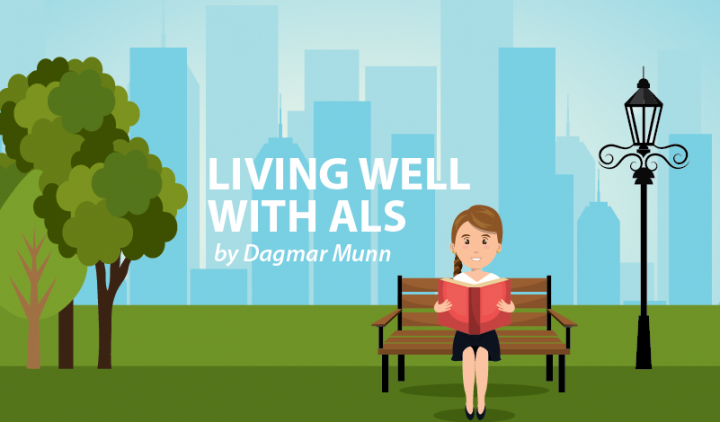How I Cruise Through the Slow Lane of ALS

There’s no doubt about it — living with ALS has sure slowed me down! And if you have ALS, you probably feel your life slowing down as well.
It’s good to know that you’re not alone. Moving, eating, and talking more slowly, and feeling fatigued are common symptoms for people living with ALS.
During my first year of living with ALS, I tried to match the productivity levels of my previous zippy self. I’d throw myself into the day, expecting to accomplish many things, but I always ended up utterly exhausted by early afternoon. My feet felt like cement blocks, and my brain was burned out.
Rather than fight my new normal of living in the ALS slow lane, I decided to embrace it. I now follow a set routine of daily habits that can accommodate my body’s ebb and flow of energy. I can accomplish my important goals, and I don’t feel guilty if I have to move my less essential tasks to another day.
Here are a few of my tips:
- Firm up your daily health habits: Make sure you eat nutritious food, stay well-hydrated, and get enough sleep. Follow a daily routine, waking up, going to bed and eating meals at the same time each day.
Around 3 p.m. each day, I take a break from the computer to drink a small fruit smoothie. This gives my brain and eyes a rest, plus it boosts my energy for the remainder of the day.
- Adjust your day to match your body’s bio-rhythm.
I’m slower in the morning, and I don’t like feeling rushed, so I try to schedule medical appointments and meetings for early afternoon.
- Use assistive devices to conserve your energy: Why waste the strength in your hands and feet doing tasks that could be accomplished with an assistive device? Walkers and electric scooters are great for covering longer distances without taxing legs and feet. Boogie Boards help to conserve your voice in noisy environments.
I use an electric toothbrush to conserve the energy in my hands so that I can use them later in the evening for my favorite hobby, knitting.
- Plan as much as possible: Make a list of your goals and break them down into smaller, more manageable tasks. Plan ahead for each day for clothes, medications, and meals. Let others know how they can be of help.
I keep a wish list of low-energy projects that I can choose from on my low days so that I can end the day knowing I’ve done something worthwhile.
- Simplify and eliminate decision fatigue: Your clothing should be easy to choose from, so eliminate what you don’t wear anymore and keep everything within easy reach.
I stopped wearing earrings because my poor balance hindered me standing at the dresser to select and put them on. I’ve since moved my earring holder to the area where I sit and get dressed. Now I can take my time and not feel stressed.
- Exercise: Yes, it’s important to exercise to counteract sitting and poor posture and to keep weakened muscles healthy.
I break up my exercise sessions into 10- and 20-minute sessions throughout the day. The routines vary from sitting, standing on the floor, and even lying in bed. I also do specific breathing exercises that help me maintain a high lung function score.
- Finally, before going to sleep, remind yourself of all you’ve accomplished that day. Be grateful for the good things that happened and mentally thank those who were there to help you.
If ALS has you living in the slow lane, try my tips and your day just might go a little smoother.
As I always say, we can live well while living with ALS.
***
Note: ALS News Today is strictly a news and information website about the disease. It does not provide medical advice, diagnosis, or treatment. This content is not intended to be a substitute for professional medical advice, diagnosis, or treatment. Always seek the advice of your physician or other qualified health provider with any questions you may have regarding a medical condition. Never disregard professional medical advice or delay in seeking it because of something you have read on this website. The opinions expressed in this column are not those of ALS News Today or its parent company, Bionews Services, and are intended to spark discussion about issues pertaining to ALS.








Charlie
"I use an electric toothbrush to conserve the energy in my hands so that I can use them later in the evening for my favorite hobby, knitting."
Knitting ?????
All hail to ultra-ULTRA- U L T R A Slow ALS Progressors. We envy you your good fortune.
Knitting in this particular ALS location ceased some very few weeks after diagnosis. This author's experience is, I feel, diametrically different to that of most ALS victims.
Dagmar Munn
Charlie - - Don't be so quick to put down the act of 'knitting.' :-) We all have different interests and ways of creative expression that help us continue to feel good about ourselves. Some pALS may conserve hand strength in order to paint or play board games with grandchildren. Likewise, our progression through ALS differs from each other. I hope that by my continuing to follow good health habits, maintain a positive mindset, be proactive in the use of assistive devices and confer regularly with the medical team at my ALS Clinic - - I am supporting a possible slower progression of this disease.
Charlie
This location's ALS patient loved knitting and was quickly forced to give it up forever because of ALS.
You are profoundly mistaken if you think I am "putting down" knitting as a wonderful hobby/ability/therapy.
I can see with absolute 20/20 hindsight how knitting was a lifelong love of our pALS, but one forced into tearful abandonment because of this awful disease.
This location is deeply envious of your continued ability to maintain knitting for all its positive reasons.
Dagmar Munn
Charlie - "The knitters of the world have you back in their good graces." :-) And I apologize for misinterpreting your earlier comment. On this, I think we can all agree: the cure for and prevention of ALS cannot come too soon!
Charlie
"I am supporting a possible slower progression of this disease."
You have mentioned that you were diagnosed in 2010. You have also mentioned that you have only recently had to stop using the coffee machine and today you say you are still knitting.
You do not have a "possible" slower progression.
You have a "definite" slower progression and clearly one of the mildest forms of ALS.
Little wonder you remain so positive. Spare a thought and a prayer (to science) to those who are forced into the realism of statistical progression, who are the pALS majority.
Dagmar Munn
Yes, my upper body is progressing far slower than that of my lower body. Comparing experiences to those of others only leads to frustration. We pALS and cALS should remain united in extending support and hope to each other and continue to push for a cure.
Susan
Thank you, Dagmar, for your positive attitude and uplifting columns. Regardless of where one is on this challenging ALS "road", it seems to me better to at least TRY to focus on the positive whenever possible. I so look forward to your weekly pep talks. They really help me try to stay away from the dark side one to which one can so easily succumb. Please keep them coming!
Dagmar Munn
Thank you Susan!
Doug Harbin
Not sure what the square footage of my bed is, but that's where I reside now. I am on a vent and feeder, but there are some positives. I am a former PE/Athletic Director, so I love sports. I have a tv. I watch the NFL channel and Family Feud. My EXTREMELY supportive, loving wife comes almost every day and spends the day and evening with me. Without her, I wouldn't be here. She worked diligently to get me this computer that I operate with my eyes. She keeps a watchful eye on the way I am treated. I recently started a Twitter account so I can keep an eye on the Rams and Lakers. I also have a WONDERFUL daughter who just finished her first year in PA school. I guess what I am driving at is try your best to focus on the things you enjoy and are thankful for and not ALS. Also, try your best to keep your sense of humor! You will live longer and live happier. Thank you for your time.
Blane Ebersold
Whatever pace ALS progresses, it is totally unfair. If Dagmar's progression was faster she wouldn't have the time to reflect on ways to cope with it. We are lucky that she is generously sharing what she is learning along the way. Thank you Dagmar for going out of your way to share your experiences.